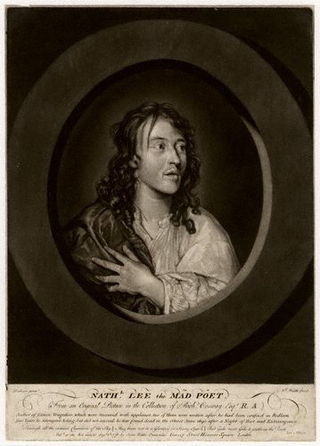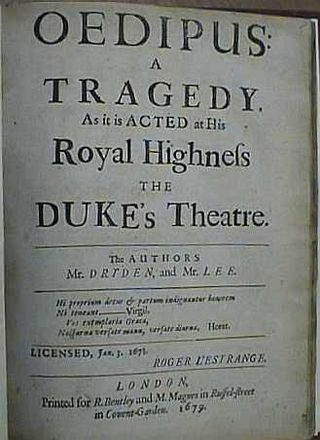| The Duke of Guise | |
|---|---|
 Title page of the 1687 edition | |
| Written by | John Dryden |
| Date premiered | 4 December 1682 |
| Genre | Tragedy |
The Duke of Guise, a Tragedy is a tragedy by John Dryden and Nathaniel Lee, published in 1683.
| The Duke of Guise | |
|---|---|
 Title page of the 1687 edition | |
| Written by | John Dryden |
| Date premiered | 4 December 1682 |
| Genre | Tragedy |
The Duke of Guise, a Tragedy is a tragedy by John Dryden and Nathaniel Lee, published in 1683.
Dryden co-operated with Nathaniel Lee in producing the Duke of Guise. The story, which in Dryden's early effort had been intended to suggest a parallel to the English rebellion, was now to be applied to the contest of the court against Shaftesbury and Monmouth. Dryden, however, did his best to extenuate his own responsibility in a Vindication of the Duke of Guise separately published. [2]
The play was first acted on 4 December 1682, and encountered a stormy and dubious, if not an unfavourable, reception. the piece was ultimately enabled to maintain its ground with more general approbation. It was performed by the United Companies, and printed in 1683. [3]

John Dryden was an English poet, literary critic, translator, and playwright who in 1668 was appointed England's first Poet Laureate.

Nathaniel Lee was an English dramatist. He was the son of Dr Richard Lee, a Presbyterian clergyman who was rector of Hatfield and held many preferments under the Commonwealth; Dr Lee was chaplain to George Monck, afterwards Duke of Albemarle, but after the Restoration he conformed to the Church of England, and withdrew his approval for Charles I's execution.
Thomas Rymer was an English poet, critic, antiquary and historian. His lasting contribution was to compile and publish 16 volumes of the first edition of Foedera, a work in 20 volumes conveying agreements between The Crown of England and foreign powers since 1101. He held the office of English Historiographer Royal from 1692 to 1714. He is credited with coining the phrase "poetic justice" in The Tragedies of the Last Age Consider'd (1678).

Thomas Creech was an English translator of classical works, and headmaster of Sherborne School. Creech translated Lucretius into verse in 1682, for which he received a Fellowship at Oxford. He also produced English versions of Manilius, Horace, Theocritus, and other classics.
Samuel Pordage was a 17th-century English poet. He is best known by his Azaria and Hushai (1682), a reply to John Dryden's Absalom and Achitophel.
Junius was the pseudonym of a writer who contributed a series of political letters critical of the government of King George III to the Public Advertiser, from 21 January 1769 to 21 January 1772 as well as several other London newspapers such as the London Evening Post.
Richard Duke was an English clergyman and poet, associated with the Tory writers of the Restoration era.

The heroic drama Oedipus: A Tragedy, is an adaption of Sophocles' Oedipus Rex, written by John Dryden and Nathaniel Lee. After being licensed in 1678 and published in 1679, it became a huge success on stage during the Restoration period.
Robert Crosse (1606–1683) was an English puritan theologian.
John Evelyn the younger (1655–1699) was an English translator.
Samuel Sandford was an English character actor, known for his roles as villains.

Lieutenant-General Sir James Charles Dalbiac, (1776–1847) was a British Army officer and Member of Parliament.
Mary, Lady Slingsby, born Aldridge, was an English actress. After a marriage lasting 1670 to 1680 to John Lee, an actor, during which she was on the stage as Mrs. Lee, she was widowed. She then married Sir Charles Slingsby, 2nd Baronet, a nephew of Sir Robert Slingsby, and performed as Lady Slingsby. Theatre historians have pointed out the difficulty in identifying her roles in the period when Elinor Leigh, wife of Anthony Leigh, was performing as Mrs. Leigh, because the homophones "Lee" and "Leigh" were not consistently spelled at the time.
Charles Dryden (1666–1704) was an English chamberlain to Pope Innocent XII.
John Dryden (1667/8–1701) was an English writer. He was the second son of the poet John Dryden (1631–1700) and was educated at Westminster School and University College, Oxford. He translated Juvenal's fourteenth satire, and wrote one comedy.
Knightly Chetwood was an Anglican priest, poet, and translator.

William Gordon was a 17th-century landowner and Covenanter. He is remembered as being a correspondent in Samuel Rutherford's Letters and being one of the biographies in John Howie's Scots Worthies. He was regarded as a man of strong religious convictions and piety. In 1664 he was banished for listening to ministers who lacked a government licence, both at his mother's house and in the woods. He arrived at the Battle of Bothwell Bridge after the fighting was over and, hesitating to surrender, was shot.
Thomas Gillow was an English stage actor of the Restoration era. His name was sometimes written Gilloe or Gillo.
John Wiltshire was an English stage actor of the Restoration Era. He joined the King's Company in 1675, before transferring to the rival Duke's Company in 1679 possibly as a replacement for Matthew Medbourne who was arrested in the Popish Plot and subsequently died in Newgate. From 1682 until his death he was part of the merged United Company. According to the autobiography of Colley Cibber he subsequently joined the English Army as captain and was killed in action fighting with William III's forces in Flanders during the Nine Years' War. His surname is also sometimes spelled as Wilshire.

John Dancer was an Irish dramatist, connected with the Theatre Royal, Dublin. His works consist of several translations from Italian and French, original plays, and some miscellaneous stories and poems.